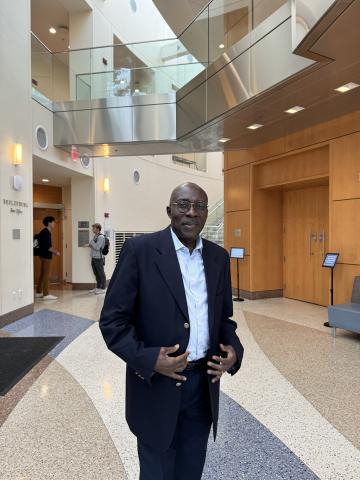Back to homepage | About the Keynote Speaker | Program Schedule | List of Presenters | About the ISMAA | Read the Abstracts | Directions

About ISMAA
The International Symposium on the Musical Arts of Africa (ISMAA) at Tufts University was founded by Professor Kwasi Ampene, who joined the Department of Music in August 2022. Ampene's vision is to create a platform for scholars and performers of African musical arts to discuss critical issues outside the scope of annual mega conferences organized by professional organizations. In this more intimate setting, Ampene aims to bring together both senior and emerging scholars for two days of dialogue centered around a chosen theme. The ISMAA is envisioned to be a biannual symposium, with the first to be inaugurated on March 28-29, 2025, in the Granoff Music Center at Tufts University. Special thanks and gratitude go to the supporters and donors of the 2025 inaugural ISMAA, especially Professor Heather Curtis, the director of the Center for the Humanities at Tufts (CHAT), for cosponsoring the symposium and for making the 2025 Coit-Phelps Lecture, one of the highlights of the event.
Theme
Dialogue between Communities of Practice and Communities of Learning: Interface between Orality and Literacy
Synopsis
African musical arts on the continent are as vibrant and diverse as the societies and communities whose creativity and performances enliven life in both temporal and non-temporal domains. As a form of communication, African musical arts operate within a larger framework of orality where musical sounds and expressions constitute symbolic and living curricula, which consistently generate knowledge systems about the African worldview. Orality, however, does not imply lack of literacy, as songs, instrumental accompaniment, storytelling, epic poems, instrumental music, and the physical body of musical instruments indexes literacy in subtle and intricate ways. Taking inspiration from Jean Lave and Etienne Wenger’s (1991) notion of “communities of practice” and further elaboration of the concept by Wenger (1998), we refer to African societies that continue to rely on orality to construct knowledge systems that are consistently passed down through generations as communities of practice. Focusing on literacy or text-based knowledge systems since the beginning of the twentieth century, professionally trained academics from European-based educational institutions, whom we classify as “communities of learning,” regularly consult with African communities of practice and transform their indigenous knowledge systems into ethnographic texts and other media for audiences within the academic and non-academic spheres. Despite the century-long interactions between the two communities, the forms of dialogue remain under-explored while several questions remain unanswered. For instance, what assumptions and prejudices influence the publication and presentation of ethnographic data? What institutional pressures, intellectual fashions, and individual dispositions impact the publication of ethnographic texts? Who evaluates these texts, and who benefits from them? What ethical considerations come into play in the interactions between the two communities? And what role have ethnographers and the academic institutions they represent played in both promoting and hindering the development of African musical arts?
The 2025 International Symposium on the Musical Arts of Africa (ISMAA) brings together representatives from African communities of practice and a cast of interdisciplinary academics (communities of learners) from ethnomusicology/African musicology, literary studies, environmental and urban studies, art history, history, museum studies, and anthropology to address the above questions and additional queries that may arise. The symposium seeks to unpack the multifaceted relationships between African communities of practice and researchers who study, interpret, and transform African knowledge systems into scholarly orthodoxies for both academic and non-academic audiences. Ultimately, the ISMAA will foster crucial dialogues on critical issues, including: (1) the imbalanced power dynamics between researchers and African communities, (2) the persistent challenge for African societies to access scholarship produced in the West, and (3) “research fatigue” among African communities, which occurs when Africans become uncomfortable and less receptive toward Western academics. This two-day symposium will take place on March 28 and 29, 2025, in the Department of Music at Tufts University. Friday, March 28, will feature a full day of panel discussions and presentations where academics will explore their relationships with the African societies they study, while master performers from Africa also share their experiences working with scholars. Academics will further explain how they receive, deconstruct, and reconstruct orally based African knowledge systems into texts for academic and non-academic purposes. Saturday, March 29, will feature a royal convocation of ahene (chiefs) and ahemaa (queens—i.e., female rulers, not the wives of chiefs) from the Asante Kingdom in Ghana. The guest speaker, Ɔheneba Akwasi Abayie, the Otumfuo Asantehene’s Akomforehene and distinguished royal oral historian, will deliver the 2025 Coit-Phelps Keynote Lecture. The keynote lecture will be in the form of an oral narrative covering over five centuries of Asante dynastic history from Ɔpemsoɔ Osei Tutu in the 17th century to Otumfuo Osei Tutu II in the 21st century. The royal convocation and Ɔheneba Abayie's lecture will integrate vibrant musical performances by master drummers, singers, and dancers of Asante, Ewe, and Dagbon musical traditions.